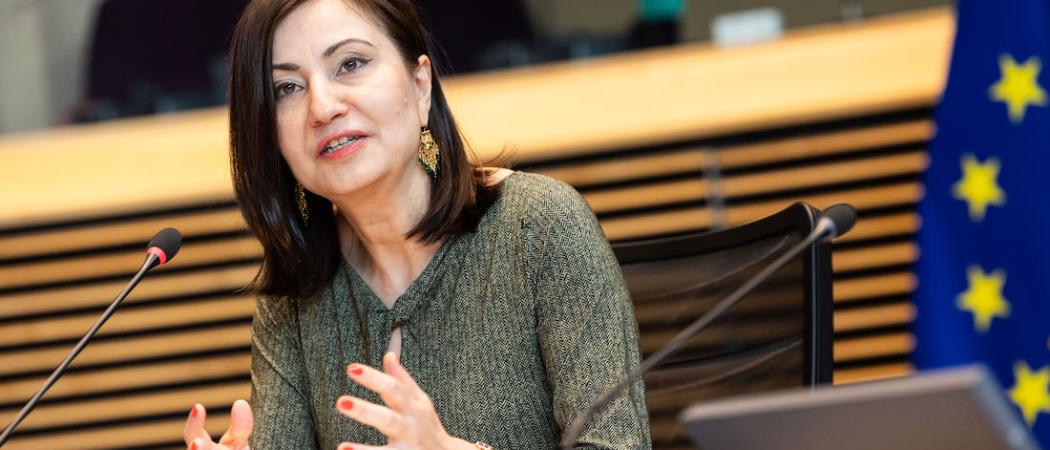AI-powered European science can drive innovation and economic growth for decades to come, says outgoing research commissioner Iliana Ivanova

Photo: European Union
Artificial Intelligence (AI) is transforming science at breakneck speed. It is not only enabling groundbreaking discoveries but provides completely novel answers to the big challenges we face, such as climate change or antimicrobial resistance. AI in science also holds the potential to achieve such answers much faster than ever before. As the Commissioner responsible for research and innovation (R&I), I am excited about the potential of AI-enabled science. To make the best of that potential, Europe urgently needs to strengthen its position in what promises to be the future of R&I.
As the integration of AI into science is becoming indispensable, Europe needs a targeted, updated science policy to maintain the competitiveness of our scientific community. This policy should equip scientists with the necessary technology, foster innovation and ensure that they can compete globally. Key areas include access to scientific data and dedicated high-performance computing as well as agile funding mechanisms. The recent recommendations of the Commission’s group of chief scientific advisors highlight the need to stimulate public-private partnerships and invest in AI technologies tailored for research. One of the most significant proposals of the advisors is to create a European powerhouse for AI in science, bringing together these critical elements.
Their advice was heard and reflected in the political guidelines of the new Commission. Announcing her mission letters to the new commissioners-designate, President von der Leyen requested “a strategy to increase the uptake of AI by European scientists” and “a European AI Research Council where we can pool all of our resources”. AI in Science is now high on the European political agenda.
The urgency is palpable. The EU, once a world leader in publications using AI as a tool in research, has been overtaken by China and closely followed by the US. Similarly, Europe's share of AI patents is declining. To regain our leadership, we need coordinated action and better-targeted public and private European investments, as confirmed by a recent report by the European Court of Auditors.
To lead the AI revolution in science, we must address the fragmented landscape of research data, talent and infrastructure. We are upgrading our network of High-Performance Computers to transform them into true AI Factories. We already have the European Open Science Cloud (EOSC), a flagship initiative by the EU and its Member States to provide seamless access and reliable re-use of data and services for researchers across Europe. EOSC will become a key catalyst across scientific disciplines for the transition towards high-quality and AI-ready data and computing power. By boosting collaboration, it will accelerate AI adoption in science. And we can leverage our regulatory framework, particularly around copyright, AI and data, to facilitate the circulation of knowledge.
Funding is crucial to achieving our goals. Horizon Europe, our research and innovation programme. has funded over 1,000 AI-related projects in fundamental science in recent years just through the European Research Council (ERC), amounting to more than €2 billion. In addition, the European Innovation Council (EIC) has supported numerous AI projects and companies with investments exceeding €500 million. These companies include startups like Iris.ai, which uses AI language models to accelerate scientific research processing. Recent EU initiatives such as GenAI4EU aim to stimulate the development of foundation models in science and science-specific AI technology. With upcoming funding, we aim to push the boundaries of research even further while maintaining our rock-solid commitment to trustworthy and responsible AI. Ethical principles are embedded in the evaluation process of Horizon Europe projects, with significant investments dedicated to addressing potential bias in AI related to gender, ethnicity and socio-economic status, and to preventing algorithms from amplifying such bias.
AI presents opportunities and challenges that are specific to science. They include issues such as trans-disciplinarity, plagiarism, reproducibility and AI use in peer review. This is why, in March this year, we published guidelines for the responsible use of generative AI in research. Developed with countries and R&I stakeholders in the European Research Area, they provide a solid and straightforward framework for the scientific community. I invite the research community to continue giving us feedback so that we can jointly ensure that EU science remains up to speed on AI.
The excellent and diverse European scientific community across all disciplines is our strength. Policymakers, researchers and industry leaders are already discussing the path that the EU should take to create a thriving, AI-driven research ecosystem. I am confident that we are on the right path to creating the next-generation scientific technology, enabled by AI that is explainable, trustworthy, energy-efficient and driven by societal and scientific challenges. Our goal is to harness this powerful technology for the benefit of our society.
Our commitment to this effort will determine our future position in the competition for global scientific and technological advancements. We have laid a solid foundation for what remain priorities for the next European Commission 2024-2029: a reinforced role of science, a strategy for increasing the uptake of AI by European scientists, as well as a European AI Research Council to pool resources for Europe’s competitiveness. AI-powered European science can drive innovation and economic growth for decades to come.
Iliana Ivanova is European Commissioner for innovation, research, culture, education and youth





 A unique international forum for public research organisations and companies to connect their external engagement with strategic interests around their R&D system.
A unique international forum for public research organisations and companies to connect their external engagement with strategic interests around their R&D system.